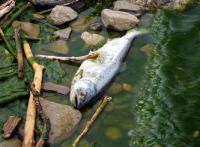

Anglian Water has been fined £35,000 and ordered to pay full costs of over £7,000 after a sewage treatment works discharged sewage into the River Wid in Essex for more than three hours, killing hundreds of fish and invertebrates. The incident in September 2009 affected more than 2km of the river and was categorised as “most serious” by the Environment Agency.
Mrs Anne-Lise McDonald, prosecuting for the Agency, told Chelmsford Crown Court that Anglian Water records showed there were power problems on-site on the weekend in question. There is a back-up generator on-site and on the night of the offence there was a power failure and the emergency generator failed to operate. The lack of power meant the works discharged directly into the river. An electrician sent to Anglian Water’s Doddington operations management centre at 9:25pm thought he had been sent there to turn off the back-up generator, but when he did, everything at the works stopped so he turned it back on again.
He was told to leave the generator running, but ten minutes later it stopped working and he thought the fuel had run out. Neither the electrician nor the operations staff knew where to get more fuel. An employee dispatched to get more from Chelmsford works was diverted before he could get it back to Doddinghurst.
At 1:20am the electrician found and checked the main power supply for the works. Mrs McDonald commented, “The electrician turned the isolator off and on again and the power came back on. It was not clear whether the power failure was due to the electrical supply to the works or to a fault on the main power supply within the works.
It wasn’t until 3:20am the following day before there was confirmation that the tank was re-fuelled. The site treatment manager told investigating officers that due to thefts of fuel at the site, only a limited amount was kept there. Procedures were in place to deal with this kind of incident, however they were not followed.
After the hearing, Environment Agency officer Tim Poulding said, “A catalogue of errors led to this pollution seriously affecting wildlife on the upper stretches of the River Wid. A large number of fish were killed and an aerator had to be used further downstream to compensate for low oxygen levels.”